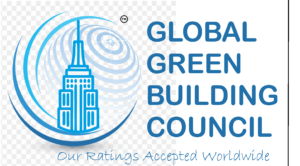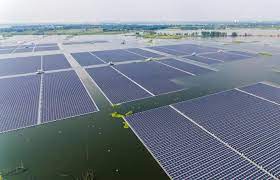Courtesy : www.deltares.nl
Floating solar energy
Solar panels floating on water are an increasingly common sight in the water-rich Netherlands as a way of producing sustainable energy. Small-scale experiments are being conducted with floating solar panels in various locations here, both on lakes and on the North Sea. The first large solar farms have been installed on water in countries such as Korea, China, Japan and America to achieve the enormous upscaling of renewable energy production. However, the effects on water quality and the aquatic ecology of these floating solar installations are still largely unknown. The impact on ecosystem services and our living environment are therefore unclear as well.

Potential positive and negative effects of a floating solar farm.
Deltares is studying the direct and indirect effects of solar farms on water. That knowledge is needed to make good decisions about the design and management of floating solar farms on a large scale. We are also looking at the various goals and functions of the water. This knowledge effort for solar energy involves working with, among others, water authorities, municipal and provincial authorities, the private sector and other research institutes. Our ambition is to have a clearer understanding of the impact of floating solar energy in three years from now. We want to know:
- what the effects are
- whether the effects are positive or negative
- how big the effects are
- whether negative effects can be mitigated by making design adjustments
- whether it is possible to establish acceptable permit conditions from the point of view of water quality and the ecology
In this way, we will ensure that decisions can be taken on the basis of sound knowledge. For example, we can ensure that water authorities not turn down permit applications by being over-cautious because of a lack of knowledge. Our aim is also to make sure that we still have clean, healthy and sufficiently fresh surface water.
Multiple use of space
Innovative solutions that facilitate the multiple use of space, such as floating solar farms in combination with water storage or improvements to nature and water quality, are high on the global agenda. Ideas such as combining hydroelectric reservoirs with floating solar panels are put forward regularly. The idea of solar atolls on the IJsselmeer lake is another good example in this context. But the combination of solar farms with new developments such as marine farms is also being considered. To establish a picture of feasibility and the effects on the water system, Deltares uses existing hydrodynamic and ecological models to simulate and predict the situation. We can deploy these models to describe the effects, such as the reduction of light penetration or possible changes in the flora and fauna. We are also looking at the interaction between solar panels and waves. Do these floating structures dampen waves and can they cope with the wave climate on the North Sea, for example? Which configuration of solar panels results in the maximum dampening effect? We can answer these questions using our physical wave facilities and wave models. This knowledge is essential to establish win-win situations and facilitate the multiple use of space.





